
From the perspective of modern discourse theory, the book in the form of an autobiography is a cultural discourse about life and journalism - which only the author has the "authority" to speak out and explain. He is a politician (former member of the Party Central Committee; former Deputy Head of the Central Ideology and Culture Committee; former President of the Vietnam Journalists Association ; former Editor-in-Chief of Nhan Dan Newspaper; National Assembly Delegate of the 10th and 11th terms; former Chairman of the Central Council for Theory and Criticism of Literature and Art, term (2011-2016). He is also a cultural researcher (with books rich in scientific content, typically Vietnamese People in the Integration Period - National Political Publishing House, 2023...; Vietnamese People in the New Era , National Political Publishing House, 2025). He is a writer with style (typically the collection The Country Through the Stages of Journalism , National Political Publishing House, 2007). He is a poet with 13 poetry collections written in the past 15 years, highly appreciated by public opinion.
Passion and dedication to journalism
Hong Vinh can be generally called a dedicated and devoted person, devoted to the ideal - true to To Huu's verse: "Offering everything to worship the ideology". Not only Hong Vinh, but in fact, in the years entering the resistance war against the US to save the country, an entire generation of young people were "dedicated" like that. When the country was at war, the quality of sacrificing oneself to save the country was a sacred and noble cultural value. Poet Thanh Thao spoke for the souls of millions of soldiers: We went without regretting our lives/ (How can we not regret our twenties)/ But if everyone regrets their twenties, what is left of the Fatherland? The pages written hot and fresh about life on the battlefield, the thoughts about the ideals and ambitions of young intellectuals are contained in countless diary pages, typically Dang Thuy Tram's Diary, Nguyen Van Thac's Diary... Today's readers can only access the touching and pure feelings of love for the country from the few manuscripts that are still preserved. In fact, during those days when “the whole country was on the move”, there were tens of thousands of such authors and millions of such diary pages. Isn’t it the highest cultural act to contribute one’s youth, one’s flesh and blood, one’s body to the cause of national liberation? In this book, Hong Vinh shows readers the “devotion” from the perspective of a journalist who overcame all hardships to write about the depth of the action of overcoming the rain of bombs and bullets to achieve the sacred goal: “All to defeat the American invaders”.
He devoted himself to living his life to the fullest. As a student, in addition to being a good student, Hong Vinh was admitted to the Party in his third year (1967). At that time, joining the Party was very difficult due to a somewhat strict view, so during the years of fighting the Americans, students like Hong Vinh were classified as "petty bourgeoisie". Therefore, when approving admission to the Party, it had to go through many levels: Party cell, History Department Party cell, then forwarded to the Hanoi Party Committee for approval. At that time, the person who signed the decision to admit Hong Vinh was Mr. Tran Vy, Deputy Secretary of the Hanoi Party Committee. After working at Nhan Dan newspaper for less than 3 years, he was sent to work as a war reporter in Truong Son and the fierce Binh Tri Thien front, and had many life and death experiences. The battlefield was always a "school" to train the spirit, determination, and revolutionary will. Since then, Hong Vinh has become more mature, increasingly strong and powerful in expressing the way of life about Vietnamese revolutionary heroism. All of these things served as a support and foundation for him to later study and successfully defend his journalism thesis abroad. Returning to the country, he became a manager and operator of large, sensitive and sophisticated agencies (Nhan Dan newspaper, Central Ideology - Culture Committee, Central Council of Theory, Criticism and Literature), and he did well in all of them. The story he told to the General Secretary to "review" Nhan Dan newspaper showed that people holding high positions had to work very hard and arduously when carrying out their work at the largest political newspaper in our country. It was thought that people like him rarely encountered lawsuits, but once he was accused of "receiving bribes" to prevent newspapers from publishing articles about a complicated and sensitive case. But with his impartiality and respect for justice, the "green tree" Hong Vinh still "spreads its branches and blossoms". For people like him, dedication is the goal and also the driving force in life as well as in directing the press.
Understanding life, sympathizing with people
There is a general principle of art: From deep understanding to ultimate empathy to sympathy, only then can we create the power to communicate with readers. Journalism has contributed significantly to Uncle Ho's extremely excellent fulfillment of his role as a pioneer, guide and helmsman of the Vietnamese revolutionary boat. In his Letter to the Huynh Thuc Khang Journalist Class (May 1949), he wrote: "To write a good newspaper, it is necessary to: 1. Be close to the people, just sitting in a paper room and writing cannot write practically..." ( Ho Chi Minh Complete Works , volume 5, 2002, p. 626). That is a lesson for journalists to practice life skills throughout their lives, to immerse themselves in life, to dive to the bottom of the river of life to be able to write about the true nature of the problem.
Once, when he returned to bail water to fight drought in Ha Dong, seeing a well-dressed journalist, Uncle Ho said: "A farmer journalist must know how to work like a farmer to write correctly" ( Ho Chi Minh - Portrait of everyday life , Labor Publishing House, 2005, p.101). Today, the world believes that, with "a pen and paper", journalists are pioneers, bravely raising thorny issues of the times and knowing how to analyze them in a sharp and convincing way. Journalist Hong Vinh, who came from a farmer background, has devoted himself to following that direction.
Reading Reflections ..., we see that Hong Vinh is one of the journalists who persistently studies and practices Ho Chi Minh's journalistic style, especially in his simple, easy-to-understand writing style - as former Editor-in-Chief Hoang Tung commented. Throughout his life as a journalist, he deeply understood the saying that "to be a good journalist, every journalist should do well the process of READING - GOING - THINKING - WRITE". Those things are not new, compared to Uncle Ho's teachings, compared to many classics about accumulating life experiences to write. But for Hong Vinh, that was a lesson learned by heart. His journalism career could only be the result of diligence accumulated from the wartime, constantly learning from colleagues, especially when he had the opportunity to travel to most of the provinces and cities of Vietnam, then twice to Truong Son, three times to Truong Sa and visiting, learning from experiences through 40 trips to many countries... But that is only the surface, the deeper nature is to draw lessons for oneself, like a river, the alluvium always settles to build up the banks. Hong Vinh's articles always have the alluvium grains from the sedimentation of life, so they are both rich in cultural content and profound in contemplation of experience, so they easily touch the hearts of readers.
As a consequence, or perhaps an inevitability, people like him are very humble and sincere in accepting very small things from others. Hong Vinh recounted with admiration how journalist Hoang Tung reviewed the article, such as correcting the three words "dien den" (mentioned), removing the word "den" because it was redundant (from Sino-Vietnamese, "cap" means "to come"); "tha gia vao" (participating in), removing the word "vao"... These things show that, for the press, each word is a "cultural code" that both conveys information and conveys the writer's capacity and personality...
One heart, one passion; one love
A writer said: To "marry" people, you must be "salty" first. The philosopher Descartes said: "You have to bite the bone to suck the marrow." They meant to immerse themselves in life, persistently find the core of the event to write well. Nowadays we often call it "heart and soul" - the premise for creativity. Heart and soul means deeply loving, passionately remembering, feeling the pain of others, and being happy with others' joys. It was necessary for Hong Vinh to have this to write 13 volumes with hundreds of "standing" poems. Through Reflection ... it is shown that he had to read dozens of articles about many cases that the newspapers had mentioned in order to have reasonable and appropriate propaganda instructions. In addition to ideology and courage, but above all, a heart that knows how to hurt people, a deep love for people creates impartiality, objectivity, and persuasion... Journalists must write with "literature" to win over readers. The reason why Hong Vinh tells the story of his martyr brother so truly and touchingly is not only because of his inherent deep affection, but also because of his literary quality, which he always pays attention to polishing and enriching.
It should be emphasized that, thanks to Hong Vinh's direct participation in the resistance war against the US in Truong Son, working as a war correspondent, he was tested to become what he is today. After the country was unified, after studying journalism in the Soviet Union, he returned to the struggle to enter the practice of working to build the country... His biography and career show that he is one of the typical examples of the model of a cultural person (artist, intellectual) in the era of globalization integration in the early 21st century (according to the concept of "Cultural Philosophy" - The Cultural Philosophy): Like a strong green tree that deeply plants its strong roots in the soil: Traditional culture, real life, absorbing human civilization; then stretching its branches and leaves into the humanistic sky, photosynthesizing the light of progressive ideals; thereby producing fruits of works with unique and distinctive ideological flavors.
It can be said that, thanks to Hong Vinh's rich real life experience, exposure to many cultural sources (domestic and foreign), absorption of the ideological light of Marxism, Ho Chi Minh Thought, especially living in the light of the infinitely pure revolutionary ideals during the time of fighting the US, his works, like this book, are diverse in style, rich in content, profound in philosophy, imbued with everyday life, sacred in ideals, warm, humane in love of life and love of people. That makes us realize even more that the "tree of talent" only grows on the foundation of education and experience in many fields to have abundant cultural capital to create fiery writings. I wish him to continue his passion for writing and to keep his soul "green" in the pages that inspire love for the country and people in the era of national growth!
Source: https://baoninhbinh.org.vn/sang-mai-le-bao-song-mai-le-doi-251010095336080.html


![[Photo] Ho Chi Minh City is brilliant with flags and flowers on the eve of the 1st Party Congress, term 2025-2030](https://vphoto.vietnam.vn/thumb/1200x675/vietnam/resource/IMAGE/2025/10/10/1760102923219_ndo_br_thiet-ke-chua-co-ten-43-png.webp)


![[Photo] Unique Phu Gia horse hat weaving craft](https://vphoto.vietnam.vn/thumb/1200x675/vietnam/resource/IMAGE/2025/10/10/1760084018320_ndo_br_01-jpg.webp)

![[Photo] Opening of the World Cultural Festival in Hanoi](https://vphoto.vietnam.vn/thumb/1200x675/vietnam/resource/IMAGE/2025/10/10/1760113426728_ndo_br_lehoi-khaimac-jpg.webp)

















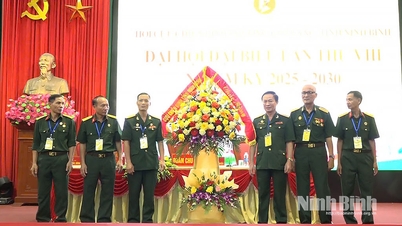
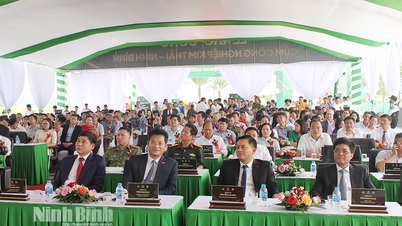
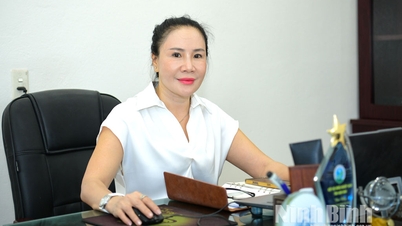
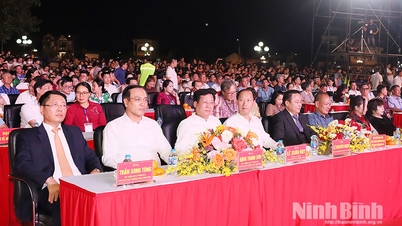
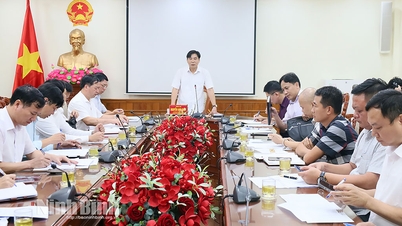



















































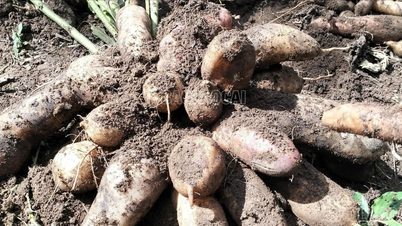















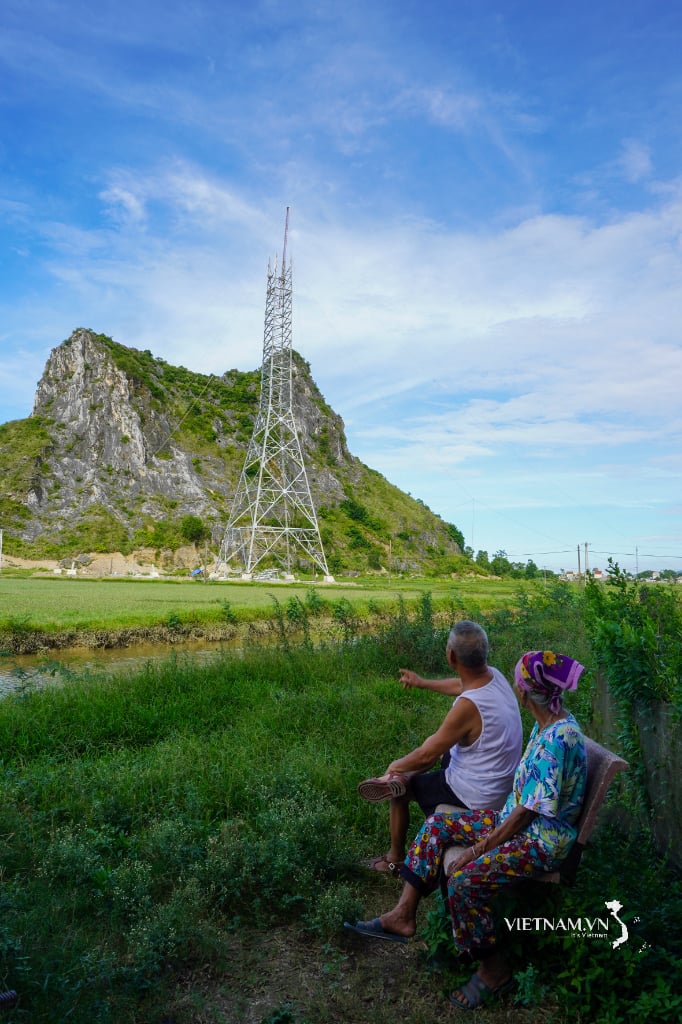

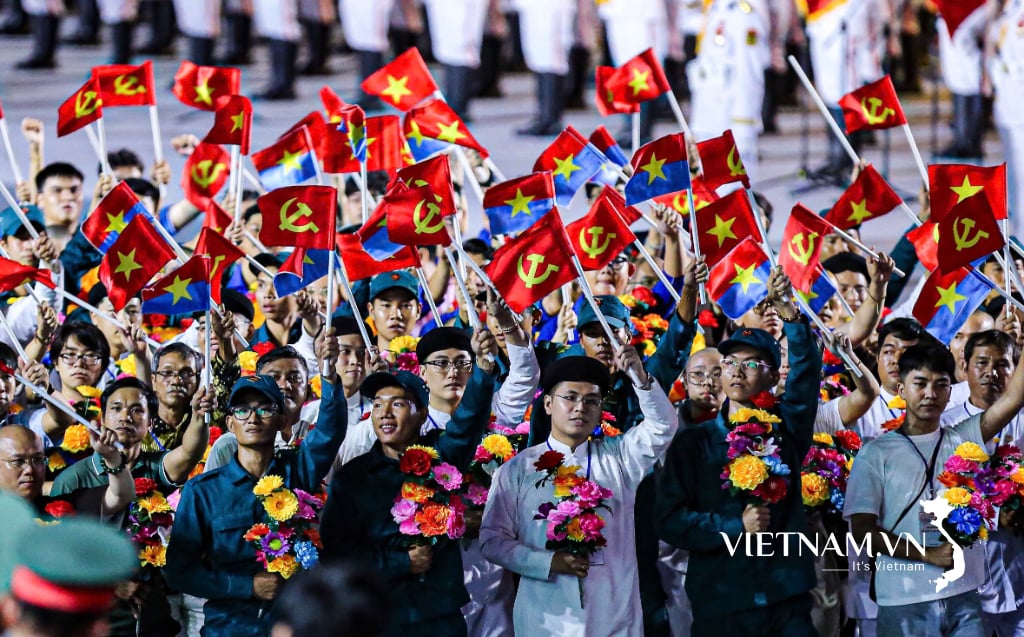
Comment (0)